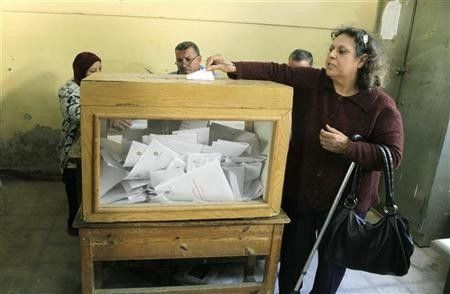Egypt's parliamentary vote starts Nov 28

Egypt's parliamentary election will start on November 28, a military source said on Tuesday, launching the process of handing back power to civilian rule nine months after President Hosni Mubarak was ousted in a popular uprising.
The source, who declined to be identified, said the military council has issued a decree inviting candidates to start registration for the elections for the upper and lower houses of parliament starting on October 12.
Egypt's Freedom and Justice Party, the political wing of Egypt's biggest Islamist group the Muslim Brotherhood, welcomed the move, which state news agency MENA said was approved by the ruling military council. But the party said it was unhappy about the election procedures which provide for some seats to be contested by party lists and others by individuals.
The (lower house) parliamentary elections will start on November 28, and the Shura council elections will begin on January 29. Candidate registration will be from October 12, a military source told Reuters, adding that a decree had been issued and was being distributed to the media.
Egypt's political parties have been pressing the military council, which took over after Mubarak was ousted in February, to speed up the transfer of power to civilian rule.
This date is positive and good. We are longing to start elections, Sobhi Saleh, a senior leader in the Freedom and Justice Party said.
But activists who helped oust Mubarak criticised the long parliamentary election process, and said they wanted a date for presidential election to be fixed.
The elections will be taking a long time and they only announced the dates for the parliamentary elections ... instead of a complete road map for a power handover, said Abdel Rahman Samir, a member of the Revolution Youth Coalition, which plans to contest the vote.
Al Arabiya television reported Tuesday presidential elections are expected to be held at the end of 2012 or the start of 2013.
The military council has decided to raise the proportion of seats contested using party lists to two thirds, up from 50 percent now, leaving the rest open to individual candidates.
The lower house will have 498 seats, down from 504, and the upper house will consist of 270 seats.
Political parties have been pressuring the army council to base the vote exclusively on the party-based proportional list system, saying allowing individuals to seek election would enable remnants of the ousted regime to use money and tribalism to enter parliament.
It is unacceptable that the dates of the elections are announced while political parties still have reservations on the electoral system itself, said Essam Sheha, a member of the Wafd Party's higher committee.
He said his party would hold meeting on Wednesday to discuss how to respond to the decision.
© Copyright Thomson Reuters 2024. All rights reserved.




















